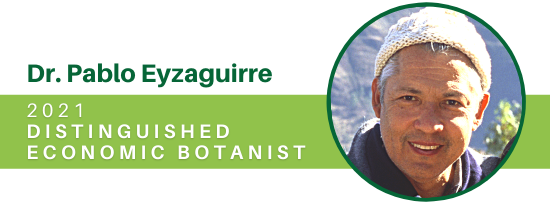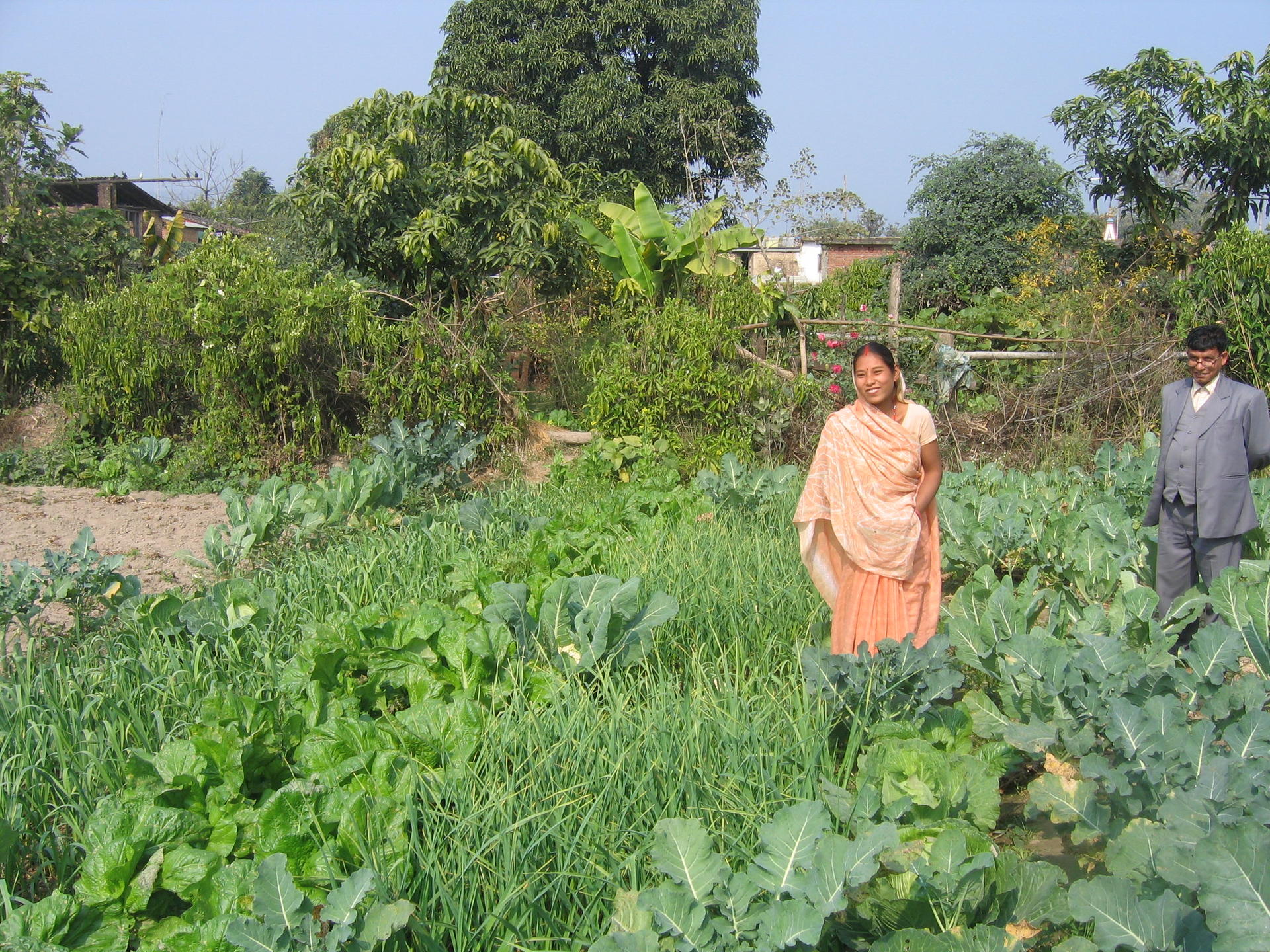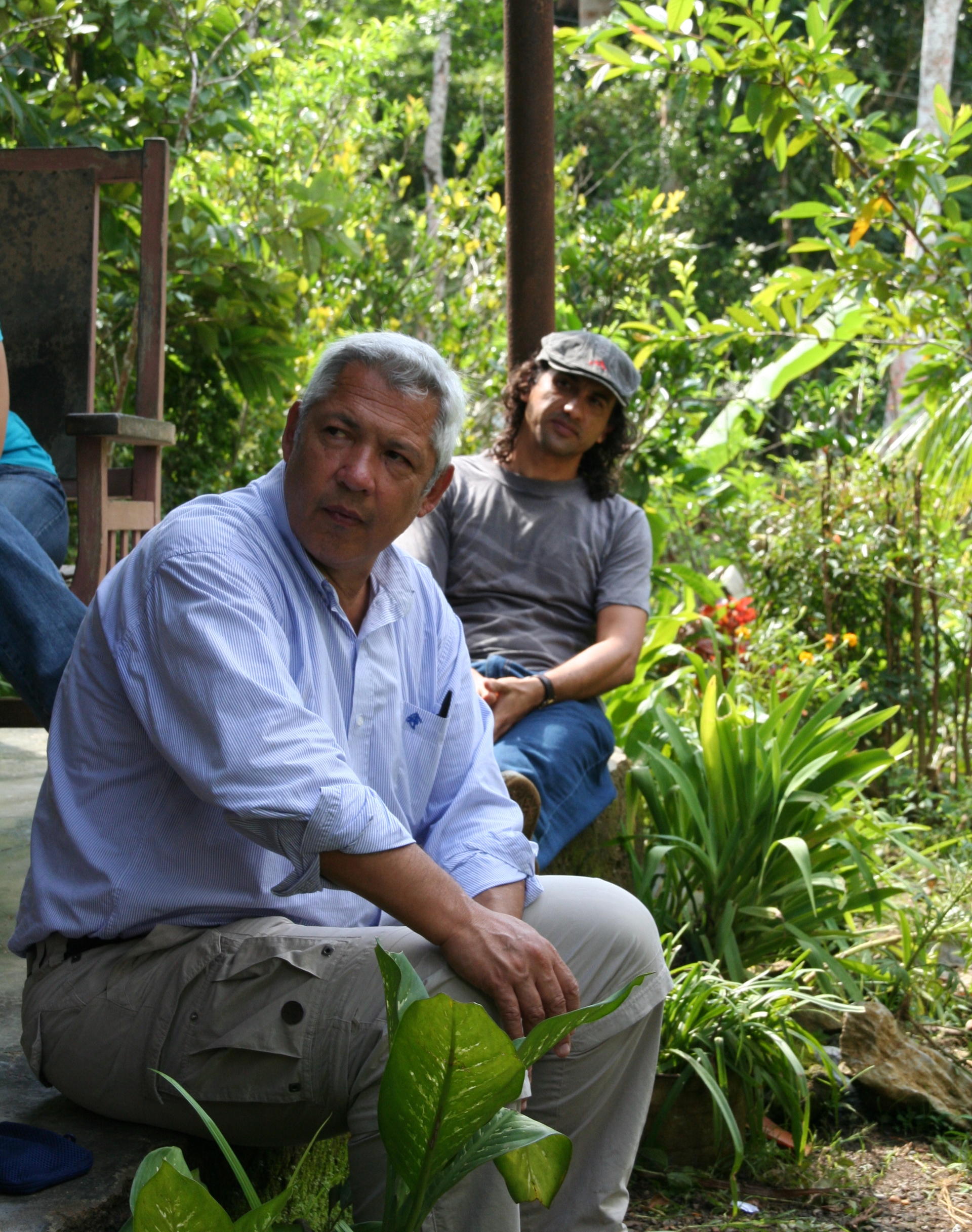Press and News Distinguished Economic Botanist Award goes to Pablo Eyzaguirre

Pablo Eyzaguirre has been honored by The Society for Economic Botany for his decades of agricultural research, particularly on the intersection of nutrition and ethnobotany. Read on to explore what has made Pablo’s work so unique.
Update: The Alliance is saddened to report that Pablo passed away on 5 June 2022. His colleagues remember him fondly for his pioneering research, incredible intellect, and irrepressible sense of humor.

“Trained as an anthropologist (PhD, Yale, 1986), [Dr Eyzaguirre’s] work has been highly interdisciplinary, at the crossroads of nutrition, plant genetic resources, and rural livelihoods. It has often shone light on topics previously overlooked in research and policy: the intersection of nutrition and ethnobotany, for example in the role of leafy wild vegetables, seed conservation in small-scale agriculture, home gardens, gender, and resilience and climate change. Dr Eyzaguirre’s work has been truly international in scope, starting with fieldwork in west Africa and expanding to take in most regions of the world, and many of the topics that fall within the remit of the Society for Economic Botany.”
Pablo Eyzaguirre’s arrival at The Alliance (then IPGRI, and later Bioversity International) was part of a move to shake up an institution established to conserve plant genetic resources. Although it had become clear that many plant genetic resources were being conserved by women and men smallholders, research and policy didn’t know what they were conserving, or how or why. An anthropologist was needed to explore and unpack the human aspects of conservation. During Pablo’s career, he frequently brought together unlikely fields of research and policy that had previously not been considered together. Two examples of his pioneering work are home gardens and biodiversity for nutrition.
Home gardens
Home gardens, where diverse trees, bushes, herbs, fruits, and vegetables are often grown together, are sites of farmer experimentation, sharing of knowledge and materials and are at the basis of household nutrition all around the world, as well as being rich repositories of genetically diverse animal and plant species. A 10-year study on home gardens from Nepal to Ghana and Cuba, surveyed these ecologically complex niches and noted their many benefits: cultural (women, often across generations, tend to have central roles in maintaining traditional crops), environmental (preserving at-risk and wild varieties, providing habitats for wildlife, and increasing climate resilience), and health (establishing a link between crop diversity, diet, and improved nutrition).

Home garden in Nepal. Credit: B.Sthapit
Biodiversity for nutrition
The concept of biodiversity for nutrition has gained such traction today that it is hard to imagine at the start of the millennium that bringing them together was an innovation. Following the revelation of the fundamental importance of biodiversity in home gardens to family nutrition, Pablo set up the Nutrition programme at Bioversity, convening actors from the World Food Programme, the UN Standing Committee on Nutrition and the Convention on Biological Diversity among others. One result of this collective action was the CBD’s adoption of the crosscutting initiative in 2006 with IPGRI, the World Health Organization, the FAO and the SCN.
This interdisciplinary research exemplifies Pablo’s decades as a driving force behind initiatives on seed systems, nutrition, and rural livelihoods, with a focus on crops including African leafy vegetables, taro, and coconut. Alliance scientist Danny Hunter reflects:
“Pablo was instrumental in bringing a much-needed multidisciplinary and evolutionary perspective to the work we do on crops largely ignored by the international agricultural research community, and the roles of people in maintaining this incredible diverse natural resource for humanity. Nothing exemplified this more than his passion for taro, and the farmers and communities who are the custodians of this diversity. He saw both as priceless assets in the conservation and use of neglected crops, and the need to understand this more to strengthen their livelihoods and wellbeing.
Pablo's work on African indigenous vegetables is another example, as is his great work on home gardens and keeping diversity ‘close to home’. Pablo’s thinking and practice went to wide issues of biodiversity and human health and wellbeing. A man so far ahead of his time!"
The Society for Economic Botany, assigning this prestigious award, writes:
“This remarkable body of work linking biodiversity and health is more important than ever, given the likely impact of climate on rural communities. We are glad to honour Pablo Eyzaguirre for his critical role in widening the horizons of our community, and his generous sharing of insights and methods that will be essential in the urgent work that lies ahead.”

Photo: N. Bergamini
Research Highlights
“A truly distinctive element of this life’s work is a commitment to catalysing research and policy development by others. Much of this has been accomplished through Bioversity International, Dr Eyzaguirre’s base for most of his career, and is manifested through countless workshops, reports, policy initiatives and projects that have disseminated skills and methods worldwide. Publications form only a part of this output, but over 5000 citations testify to their impact.”
The world is increasingly aware of the importance of agricultural biodiversity in ensuring nourishing, resilient food systems. Thanks to a growing body of research, we can understand how locally-based biodiversity conservation yields benefits for food and nutrition security, family and child health, and the maintenance of healthy ecosystems.
Selected References
- UN Biodiversity COP8 Decision: Cross-cutting initiative on biodiversity for food and nutrition
- Agricultural biodiversity, nutrition, and health: making a difference to hunger and nutrition in the developing world
- Linking biodiversity, diet and health in policy and practice
- Using biodiversity for food, dietary diversity, better nutrition and health
- Managing Biodiversity for Food and Nutrition Security in West Africa: Building on Indigenous Knowledge for more Sustainable Livelihoods (in UNSCN)
- Book: Home Gardens and Agrobiodiversity
- The Biodiversity of Traditional Leafy Vegetables
- Indicators of resilience in socio-ecological production landscapes
- The Impacts of Collective Action and Property Rights on Plant Genetic Resources
- Property Rights, Collective Action and Plant Genetic Resources
Quotes are from the full award announcement by the Society of Economic Botany.
A written interview with Pablo can also be accessed here.
